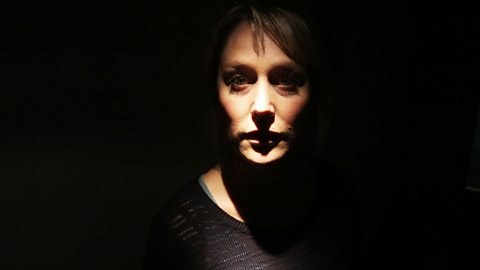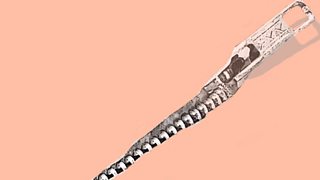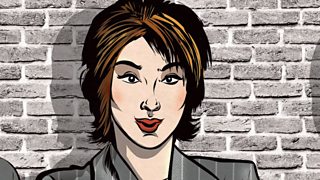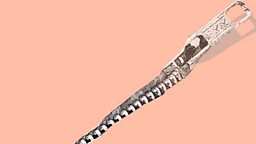She Devils through the ages
Joy Wilkinson on adapting Fay Weldon’s modern classic for Radio 4’s Riot Girls Season.
Ruth’s story is about power, money and sex.
We chose to adapt Fay Weldon’s The Life and Loves of a She Devil for Radio 4 Drama’s Riot Girls season, as it is a landmark piece of feminist literature from the 1980s. The season also includes Erica Jong’s from 1973, and three original new plays set in the , and the , following the lives of three generations of women. The whole idea was to put feminism in context: where we’ve come from, where we are now, and where we might be going next.
But as I worked my way through the adaptation, the realisation struck me – as sharply as Weldon’s spikey prose – that this novel was about how we live now. Yes, there were references to vol au vents and typists and Tippex, but in its essence, it felt like there would be very little difference if you set this story today.
The story is about Ruth (Hattie Morahan), an overweight ugly duckling abandoned by her husband Bobbo (Barnaby Kay), who has fallen in love with a beautiful romantic novelist, Mary Fisher (Lyndsey Marshal). The ultimate tale of a woman scorned, it follows Ruth’s transformation into the She Devil, who goes to extraordinary lengths to change herself and her fate. Along the way, she also changes the fates of those she encounters, from priests and judges to plastic surgeons and secretaries. Ruth’s story is about power, money and sex, and in those realms, it’s deeply unsettling how little women’s lots seem to have changed.

Mary Fisher lives in a High Tower at the edge of the sea
Romantic fiction writer, Mary, is having an affair with Ruth's husband.
The financial angle is particularly illuminating. Weldon studied economics and puts money right at the heart of the novel, showing how little women’s lives are worth the world over and how much wages count in assessing a person’s value. Accountant Bobbo works on his scale of the monetary worth of lovemaking, while Ruth’s rise is facilitated as much by her bookkeeping course as by her sexual liberation. She repeatedly references how much people earn, and although the amounts have changed since the 1980s, it’s sobering that the changes are mainly at the rich end of the scale. Ruth would need a much greater fortune to achieve her goal today, and the council estate single mum character of Vickie (Rebecca Hamilton) probably has even less help to subsist.

Ruth herself is perhaps more taboo than ever – a fat, ugly, sexually voracious heroine.
Vickie is fascinating in a comparison of how characters might change if this were set today. Weldon provocatively portrays a feckless young woman churning out babies, reliant on the state, apparently helpless, until Ruth comes into her life. This may seem shocking to today’s liberal sensibilities, but just because we tend to be more sensitive now, doesn’t mean Vicky’s predicament is any less pertinent. If the novel is dated by saying what has become unsayable, it begs the question of how much we have truly progressed?
And away from the council estate, on the nice new-build estate where aspirational families host dinner parties, the menus might seem classic 1980s, but how much has the power balance really shifted? Women may not call themselves housewives now, but many still become financially dependent on men and are left high and dry when the man leaves. It’s still taboo for those mothers to leave their children. Ruth herself is perhaps more taboo than ever – a fat, ugly, sexually voracious heroine. Not the clichéd ‘strong woman’, but a woman full of flaws and all the more fascinating for it. may also have taken revenge on her cheating husband, but it’s notable that she was a beautiful, slim, wealthy professional and only really concerned with her own life, not with changing society at large. Has feminism become tamer too? Or will a new wave reject the prevailing conventions and go on their own crusade?
I found the resonances with today so profound that in one draft, I ditched the vol au vents and experimented with chicken kievs and lasagnes, effectively making the play more contemporary. Ultimately, however, I succumbed to the needs of the season, kept it in the 1980s, and will trust in its power to speak across the decades, like all great stories. We can laugh at the vol au vents, and with Weldon’s biting wit, but will we end up laughing with the She Devil? Or wondering, will it ever change?
will be broadcast on Radio 4 on Sunday 21st and 28th of February, 2016, at 3pm.
Riot Girls
-
![]()
A darkly comic fairy tale about revenge, sex and power. Written by Fay Weldon, adapted by Joy Wilkinson.
-
![]()
Isadora is restless and yearns for the perfect, guiltless, zipless sexual encounter.
-
![]()
"I knew that if I didn't get out that morning, then my life would be over."
-
![]()
"One thing I learnt growing up, was self-reliance."








